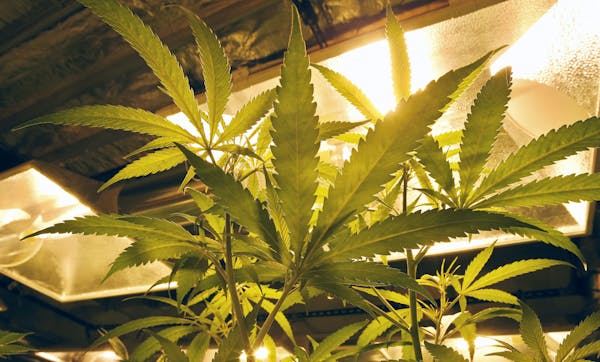Legalizing marijuana for medical use has reached the political front burner in Minnesota, prompting the state's largest doctors' group to bring fresh scrutiny to the benefits, the risks and the underlying science.
The challenge, physicians say, is reconciling anecdotal reports that marijuana can relieve pain and nausea in severely ill patients with the absence of rigorous, high-quality studies of the kind normally used to evaluate medications.
"We've never taken a stance for or against because it's never gotten to this level," said Dr. David Thorson, chairman of the Minnesota Medical Association (MMA) board of trustees. "It's something that can be somewhat divisive among physicians as well."
With the Minnesota House scheduled to hold its first hearing on the question Tuesday, the MMA has arranged a forum for its members Tuesday night and will consider taking a formal position later this year.
Minnesota would become the 21st state to legalize medical marijuana, under a bill submitted by Rep. Carly Melin, DFL-Hibbing, and public opinion polls show support for legalization.
Small studies and anecdotal reports suggest a variety of benefits from marijuana, and that its chemical ingredient THC — known for producing euphoria in casual smokers — helps reduce nerve pain for patients with multiple sclerosis, address severe nausea for patients undergoing chemotherapy and relieve pain with end-stage cancers.
Marijuana also appears, via THC, to improve appetite for patients who otherwise struggle to eat due to the effects of end-stage cancer or HIV infections.
"They just don't want to eat and they waste away," said Dr. Jacob Mirman, an alternative medicine specialist based in St. Louis Park. "So they smoke a little pot and they get the munchies and it's very beneficial for them."
Roadblocks to studies
Trouble is, marijuana is a Schedule 1 controlled substance under federal regulations, which prohibits its use as a medicine and prevents the kind of large, controlled drug studies that could prove that it's effective and that the benefits outweigh the risks, which can include addiction and psychosis.
Unless marijuana is moved to a Schedule II designation — where it would join opiates and stimulants that also have addictive qualities — such studies won't happen, and states will have to decide on their own whether to defy the existing federal prohibition.
The Minnesota bill would allow patients with doctors' permission to obtain cards they could use to purchase marijuana from vendors designated in each county, or allow them to grow plants in small quantities.
The list of conditions appears more restrictive than in California, where patients can get marijuana for anxiety and post-traumatic stress disorder — and critics suggest trickery by recreational users.
Faking it?
"Those are conditions that people can … fake if they want to get a card that allows them to use medical marijuana," said Dr. Carrie Borchardt, a child psychiatrist and president of the Minnesota Psychiatric Society. "It's really kind of a joke."
A similar medical marijuana bill passed the Legislature in 2009 but was vetoed by then-Minnesota Gov. Tim Pawlenty. Law enforcement objections could prompt Gov. Mark Dayton to do the same.
One compromise would be the approval only of a marijuana-derived oil that lacks THC and has shown anecdotal evidence of treating pediatric seizures. Whether that option is pursued could become clearer at Tuesday's hearing before the House Health and Human Services Policy Committee.
Mirman, who will present the "pro" argument in the doctors' forum, said it's illogical to keep marijuana from medical use when the law permits opiates and stimulants even though they are addictive and have similarities to heroin and ecstasy, respectively. By comparison, marijuana can be addictive but doesn't present the same risk of fatal overdose.
"It appears to be safer than a lot of drugs we use already," said Mirman, who has patients with multiple sclerosis and breast cancer who have admitted to self-medicating with marijuana.
States that approved medical marijuana, however, have experienced problems, which is one reason the Minnesota Psychiatric Society opposes the step. Recreational use of marijuana by adolescents has increased in states where medical use is permitted, and addiction treatment costs have increased, Borchardt said.
Research shows long-term addiction developing in 9 to 10 percent of marijuana smokers.
"Who might be helped and who might be harmed?" she said. "We are the physicians who deal mostly with mental illnesses and chemical dependencies. Our patients are the most vulnerable to the potential problems. So we feel the need to speak out."
Opponents point out that there are alternatives for relieving nausea and pain.
View from Mayo
Two synthetic forms of THC also are available in pill form in the United States but aren't popular because they don't take effect right away and patients can't control the dosages as they can with marijuana puffs, said Dr. J. Michael Bostwick, a Mayo Clinic psychiatrist.
A third, nabiximols, is a mouth spray with better dose control, Bostwick said, but it has been mired in clinical trials in the United States since 2006, while it has been approved in Canada.
Variations in state regulations create dilemmas for Mayo doctors when patients come from states where medical marijuana use is legal and seek advice. Mayo as a system precludes prescribing marijuana, even though its doctors in Arizona have the legal authority to do so.
Bostwick has published pro and con perspectives on medical marijuana. He wouldn't take a stand on whether Minnesota should "thumb its nose" at the federal government and approve it.
"Minnesota will be just another variation on common themes,'' he said, "none of which address the problem, which is we don't have a unified approach to studying this substance and making sure it is safe."
Jeremy Olson • 612-673-7744
Finding an apartment may be easier for California pet owners under new legislation
Jury selection could be nearing a close in Donald Trump's hush money trial in New York

